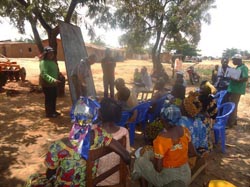Opportunities for sustainable intensification of climbing bean on smallholder farming systems in the eastern highlands of DR Congo
South Kivu is located in the eastern part of DRC. This is a productive area, but agricultural productivity has been held back by years of war, overpopulation and land degradation. The majority of the population is engaged in subsistence agriculture. However, food security is a critical issue, because most farmers do not use fertilizers, resulting in nutrient depletion and decreasing harvests.
Climbing bean is grown in mid to high altitude areas. In the eastern highlands of DRC, farm sizes are small and the huge biomass of climbing bean allows to capture a greater proportion of the solar radiation to provide more yield; three times more than bush bean. Because of the high biomass, climbing bean also has high N-fixing potential. In Northern Katana (South Kivu) Isaac met a farmer who introduced Pennisetum purpureum to support his climbing bean crop and also used it as forage for livestock that give him manure to replenish soil nutrients.
|
N2Africa/Phase II indirect dissemination activities have started in DR Congo since the launch of the second phase in February. After identification of new partners, new households were identified, trainers were trained and technology packages were distributed to households. Sange village in Ruzizi was honored by the presence of Dr. Vanlauwe, who interacted with local farmers. In his speech he said "Thank you for this special occasion you have given us to visit again. We encourage famers to do better and to raise their standard of living through agriculture" |
Dr Bernard Vanlauwe talking to farmers of Ruzizi |
At the same time, rhizobiology work is on-going with refreshment of rhizobia isolate cultures. About 105 NAC strains will be re-isolated and cultured in Congo red petri-dishes and then kept in slant. However, the rhizobium research laboratory has challenges with the running funds. This yeas it was assigned 10,000 USD for maintaining its activities: bio-prospecting, isolation and characterization, testing the best isolates strains, inoculant testing and quality assessment, and providing technical support. Nice to know is that the NAC strains have crossed Africa to IITA Ibadan, where MSc student Liliane Shukuru will compare them to the NAN strains from N2Africa Nigeria.
Jean Marie Sanginga, Despines Bamuleke, Isaac Balume. N2Africa/ IITA, Bukavu South Kivu DR Congo

